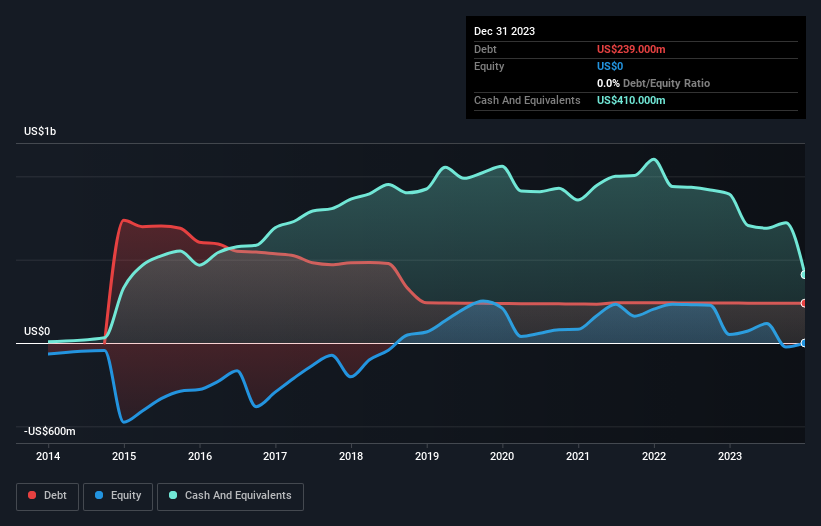
Howard Marks put it nicely when he said that, rather than worrying about share price volatility, 'The possibility of permanent loss is the risk I worry about... and every practical investor I know worries about.' So it seems the smart money knows that debt - which is usually involved in bankruptcies - is a very important factor, when you assess how risky a company is. We can see that Indivior PLC (LON:INDV) does use debt in its business. But the more important question is: how much risk is that debt creating?
What Risk Does Debt Bring?
Debt is a tool to help businesses grow, but if a business is incapable of paying off its lenders, then it exists at their mercy. If things get really bad, the lenders can take control of the business. However, a more frequent (but still costly) occurrence is where a company must issue shares at bargain-basement prices, permanently diluting shareholders, just to shore up its balance sheet. By replacing dilution, though, debt can be an extremely good tool for businesses that need capital to invest in growth at high rates of return. The first thing to do when considering how much debt a business uses is to look at its cash and debt together.
View our latest analysis for Indivior
What Is Indivior's Net Debt?
As you can see below, Indivior had US$239.0m of debt, at December 2023, which is about the same as the year before. You can click the chart for greater detail. But it also has US$410.0m in cash to offset that, meaning it has US$171.0m net cash.

How Strong Is Indivior's Balance Sheet?
According to the last reported balance sheet, Indivior had liabilities of US$1.31b due within 12 months, and liabilities of US$649.0m due beyond 12 months. On the other hand, it had cash of US$410.0m and US$254.0m worth of receivables due within a year. So it has liabilities totalling US$1.29b more than its cash and near-term receivables, combined.
While this might seem like a lot, it is not so bad since Indivior has a market capitalization of US$2.80b, and so it could probably strengthen its balance sheet by raising capital if it needed to. But we definitely want to keep our eyes open to indications that its debt is bringing too much risk. While it does have liabilities worth noting, Indivior also has more cash than debt, so we're pretty confident it can manage its debt safely.
Another good sign is that Indivior has been able to increase its EBIT by 23% in twelve months, making it easier to pay down debt. There's no doubt that we learn most about debt from the balance sheet. But ultimately the future profitability of the business will decide if Indivior can strengthen its balance sheet over time. So if you're focused on the future you can check out this free report showing analyst profit forecasts.
Finally, a company can only pay off debt with cold hard cash, not accounting profits. While Indivior has net cash on its balance sheet, it's still worth taking a look at its ability to convert earnings before interest and tax (EBIT) to free cash flow, to help us understand how quickly it is building (or eroding) that cash balance. Over the last three years, Indivior recorded negative free cash flow, in total. Debt is far more risky for companies with unreliable free cash flow, so shareholders should be hoping that the past expenditure will produce free cash flow in the future.
Summing Up
Although Indivior's balance sheet isn't particularly strong, due to the total liabilities, it is clearly positive to see that it has net cash of US$171.0m. And it impressed us with its EBIT growth of 23% over the last year. So we don't have any problem with Indivior's use of debt. There's no doubt that we learn most about debt from the balance sheet. However, not all investment risk resides within the balance sheet - far from it. For example Indivior has 4 warning signs (and 1 which is significant) we think you should know about.
If you're interested in investing in businesses that can grow profits without the burden of debt, then check out this free list of growing businesses that have net cash on the balance sheet.
New: AI Stock Screener & Alerts
Our new AI Stock Screener scans the market every day to uncover opportunities.
• Dividend Powerhouses (3%+ Yield)
• Undervalued Small Caps with Insider Buying
• High growth Tech and AI Companies
Or build your own from over 50 metrics.
Have feedback on this article? Concerned about the content? Get in touch with us directly. Alternatively, email editorial-team (at) simplywallst.com.
This article by Simply Wall St is general in nature. We provide commentary based on historical data and analyst forecasts only using an unbiased methodology and our articles are not intended to be financial advice. It does not constitute a recommendation to buy or sell any stock, and does not take account of your objectives, or your financial situation. We aim to bring you long-term focused analysis driven by fundamental data. Note that our analysis may not factor in the latest price-sensitive company announcements or qualitative material. Simply Wall St has no position in any stocks mentioned.
About LSE:INDV
Indivior
Engages in the development, manufacture, and sale of buprenorphine-based prescription drugs for the treatment of opioid dependence and co-occurring disorders in the United States, the United Kingdom, and internationally.
Very undervalued with reasonable growth potential.


